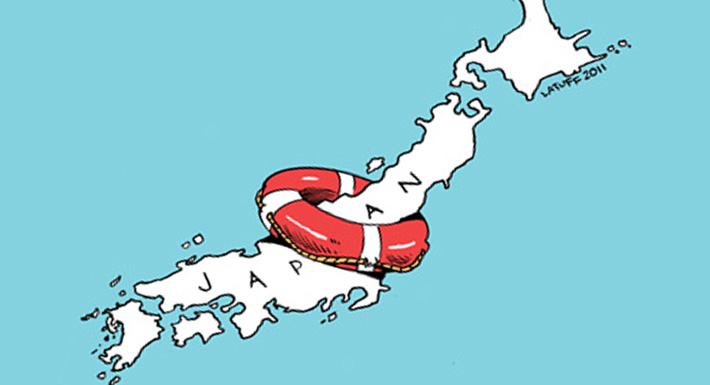by Isobel Wiles
The panic reached hysterical proportions on the Tuesday after the earthquake, prompting the “exodus” so enthusiastically discussed in the foreign media. I was still mainlining the news, hyperactively clicking and flicking between dozens of links and television channels. As a flustered Edano announced that radiation at Fukushima was now at levels that could “pose a threat to human health”, every single one of my friends in Tokyo jammed up Facebook, Twitter and my inbox with breathless warnings peppered with exclamation marks. They were all leaving Tokyo—for Osaka, Kobe, Phuket, Sydney, Russia… Envisioning myself friendless and irradiated, lacking tap water or food, I began to crack…
But when I called my boyfriend in tears, to tell him we should escape to Kobe, he told me that his company had threatened to sack anyone that left, since two employees had already taken off without notice. Not being able to bear the thought of abandoning him in Tokyo, I resolved to stay and closely monitor the situation.
After a little research, I found that despite all the high-pitched panic, the fact that radiation levels in the air were “20 times higher than usual” meant very little. It was still a miniscule amount, the same radiation you might get from one cigarette, and it immediately dropped by a factor of eight in the next hour. Within two days, it was back to normal, at the equivalent of 0.2 millisieverts per year, less than what people in Hong Kong are currently getting.
The British Embassy’s response was also reassuring. They posted a discussion with Britain’s chief scientific officer, Sir John Beddington, on their website, which explained how different Fukushima was from Chernobyl, and that there were no health risks beyond the thirty kilometer evacuation zone set by the Japanese government. Several other articles supported his argument with more data that offset the baseless scaremongering in the foreign press, pointing out that those who took long haul flights to get out of Tokyo ironically had a higher dose of radiation in airport security and inside the plane.
I grew concerned, however, when I saw that elevated radiation levels were detected in milk, vegetables, tap water and the seawater, since most of the health risks in Chernobyl were caused by people drinking water, milk and vegetables from around the site. But I calmed down once again after reading some rational analyses.
Firstly, the Japanese government’s upper limit for radiation in the water is stricter than any other country, and levels went back to normal after one day. The government also imposed an agricultural lockdown on all the surrounding areas where high levels had been detected, showing that they were prepared to make huge sacrifices in order to ensure people were safe, despite criticism that they have not been vigilant enough. The short half-life of iodine, at eight days, is also good news, as levels will fall back within safe levels quite quickly, and will completely decay in a little longer. The plutonium levels in the soil are so low that they cannot distinguish if it came from the plant or are residue from nuclear testing overseas from years ago. Irradiated seawater is worrying, but if seafood is found to have high levels, I am confident that the government will once again spread a ban across the region.
It was ironic that even after the situation grew more complicated, and perhaps worse—with high radiation detected in milk, vegetables, tap water and the sea—the media’s attention waned and people promptly trailed back to Tokyo. While I don’t wish to knock those who left, especially as I came close to doing so myself, I found it interesting to see how the media’s flailings had actually orchestrated the “exodus,” and how a diversion of their attention pulled people back. However, I do acknowledge that in the blur of news and haphazard information, it was very difficult to make a rational decision, never mind distinguish between “micro-” and “milli-”sieverts or read up on nuclear physics. I was mostly saddened by the media’s reaction, which not only caused everyone’s families to become frantic with worry, but will have serious repercussions for Japan’s image, reputation, and not least economy. Tourism will take years to pick back up again, and adding insult to injury, foreign consumers have now lost confidence in industries left reeling by the tsunami and energy woes and are even worrying that Toyotas might be “radioactive.” I find it deeply sad that at a time when the country needs support the most, the inaccuracies, omissions and the lack of context in the foreign press hurt it most. It is also a tragedy that the nuclear crisis overshadowed those suffering in Tohoku, and perhaps even inhibited donations from abroad.
However, I don’t wish to criticize those who left, unless they hurt their employers, defaulted on their rent, or defamed Japan in doing so. I didn’t throw jibes of “flyjin”, and although others who stayed in the capital have been quick to claim they did so as a sign of support or to boost morale, I think that rationale was adopted later. What’s important now is a sense of unity, both in the foreign community and Japan in general, to restore as much normality as possible in order that the country—and the economy—might recover.









